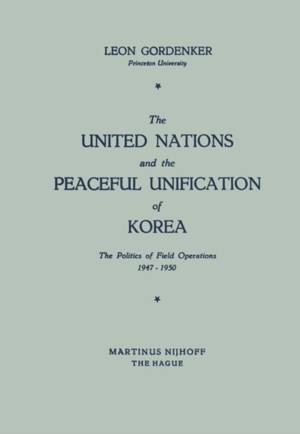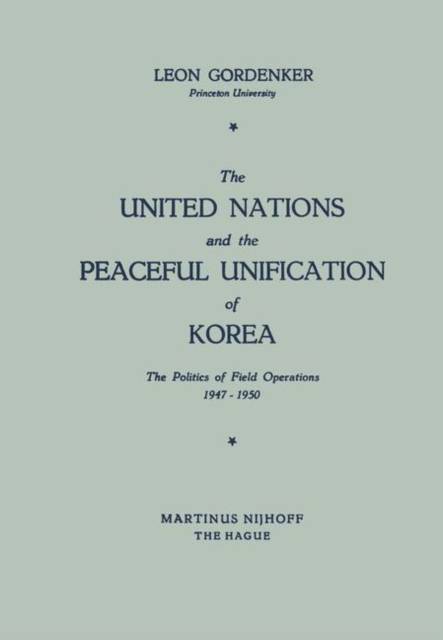
Bedankt voor het vertrouwen het afgelopen jaar! Om jou te bedanken bieden we GRATIS verzending (in België) aan op alles gedurende de hele maand januari.
- Afhalen na 1 uur in een winkel met voorraad
- In januari gratis thuislevering in België
- Ruim aanbod met 7 miljoen producten
Bedankt voor het vertrouwen het afgelopen jaar! Om jou te bedanken bieden we GRATIS verzending (in België) aan op alles gedurende de hele maand januari.
- Afhalen na 1 uur in een winkel met voorraad
- In januari gratis thuislevering in België
- Ruim aanbod met 7 miljoen producten
Zoeken
The United Nations and the Peaceful Unification of Korea
The Politics of Field Operations, 1947-1950
Leon Gordenker
Paperback | Engels
€ 104,95
+ 209 punten
Omschrijving
Where there has been fighting or the threat of fighting since the end of the Second World War, the United Nations has ahnost al- ways been involved. Frequently that involvement has taken the concrete form of a field commission or a team of observers, made up of nationals of several countries and reporting to the General Assembly or the Security Council. Even while I write this, military observers wearing special United Nations insignia are patrolling the border areas of Syria and Lebanon. Meanwhile, observation groups with a longer history are on duty in Kashmir and along the Israeli borders. A field commission of the United Nations still remains in Korea, and others had been at work in Greece, Eritrea, Somalia and on the Hungarian border. All of them lived, worked and reported in an atmosphere of controversy. Perhaps none could have claimed that their work ended in full success. Their existence, however, suggests that the United Nations has developed a special political instrument for use in troubled areas where solutions are elusive but where danger of a spreading con- flict is never distant. This study deals with the work of field com- missions of the United Nations in Korea before the violence of 1950. Their work, whatever its merit, came crashing down with the North Korean attack.
Specificaties
Betrokkenen
- Auteur(s):
- Uitgeverij:
Inhoud
- Aantal bladzijden:
- 306
- Taal:
- Engels
Eigenschappen
- Productcode (EAN):
- 9789401504263
- Verschijningsdatum:
- 1/01/1959
- Uitvoering:
- Paperback
- Formaat:
- Trade paperback (VS)
- Afmetingen:
- 170 mm x 244 mm
- Gewicht:
- 521 g

Alleen bij Standaard Boekhandel
+ 209 punten op je klantenkaart van Standaard Boekhandel
Beoordelingen
We publiceren alleen reviews die voldoen aan de voorwaarden voor reviews. Bekijk onze voorwaarden voor reviews.









